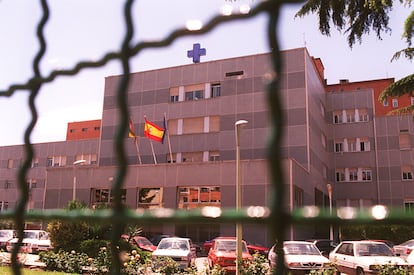Spanish woman seeks €3m in damages after ending up with wrong family due to baby swap
The complainant found out at age 15 that she had no genetic links to her supposed parents, and that a mistake was made by an employee at a Logroño hospital in 2002


A 19-year-old woman from Spain is seeking more than €3 million in damages from regional health authorities in La Rioja after discovering that she was accidentally switched with another newborn at the hospital and handed to the wrong parents.
The unidentified victim ended up in a troubled family environment and was raised by her maternal grandmother. The swap was discovered when she was 15 years old and DNA tests found she had no genetic link to the people she thought of as her family.
The case was reported by the regional daily LaRioja.com, which said the health department has admitted there was a mistake and attributed it to “human error.” However, authorities in the small northern region say that causation – whether an action has caused a harmful event – cannot be proven and they are rejecting the €3 million claim. Instead they are offering the victim €215,000 in compensation.
The other woman involved in the baby swap has been reportedly informed of the mistake, but has not filed a complaint.
Both were born five hours apart at San Millán hospital in Logroño, the capital of La Rioja, and taken to the incubator ward because they were underweight. From there they were transferred to cribs before being handed to their mothers. That is where, according to a regional investigation into the case, a hospital worker allegedly made the mistake that led to the swap.
Nobody suspected what had happened until 2017, when the woman’s legal guardian – her grandmother – filed a complaint against the father for refusing to pay child support. The man held that he was not the teenager’s father, and a judge ordered a DNA test that proved him right. Latest testing showed that the girl had no genetic ties to her supposed mother, either.
‘Tell me who I am’
The lawyer in charge of the case, José Sáez-Morga, explained that his client came to them at age 16 with a request: “Tell me who I am.”
The lawyers contacted regional health inspectors, who found 17 baby girls born around the same time at San Millán hospital, which is no longer in operation. Further investigation reduced the list to just one child, whose father (the mother died in 2018, according to the regional daily) has been asked to submit to a DNA test to see if there is a match with Sáez-Morga’s client.
The regional health chief, Sara Alba, said the case took place nearly 20 years ago and that authorities will respect legal procedures. She attributed it to “human error” and said it was impossible to find out who made the accidental switch.
English version by Susana Urra.
Tu suscripción se está usando en otro dispositivo
¿Quieres añadir otro usuario a tu suscripción?
Si continúas leyendo en este dispositivo, no se podrá leer en el otro.
FlechaTu suscripción se está usando en otro dispositivo y solo puedes acceder a EL PAÍS desde un dispositivo a la vez.
Si quieres compartir tu cuenta, cambia tu suscripción a la modalidad Premium, así podrás añadir otro usuario. Cada uno accederá con su propia cuenta de email, lo que os permitirá personalizar vuestra experiencia en EL PAÍS.
¿Tienes una suscripción de empresa? Accede aquí para contratar más cuentas.
En el caso de no saber quién está usando tu cuenta, te recomendamos cambiar tu contraseña aquí.
Si decides continuar compartiendo tu cuenta, este mensaje se mostrará en tu dispositivo y en el de la otra persona que está usando tu cuenta de forma indefinida, afectando a tu experiencia de lectura. Puedes consultar aquí los términos y condiciones de la suscripción digital.








































